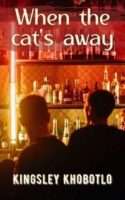When Charles walks into Freedom Square, the local watering hole, he heads straight for the grimy jukebox and impregnates it with coins. The opening to Bob Marley’s live version of No Woman No Cry announces his arrival. All those who are still sober enough to stand are invited to surrender their bodies to the music. By the time the legendary Rastafarian sings the opening lines to the well-loved hit, he is supported by a choir of drunkards. Dirty-looking glasses, brown bottles and any other container which is big enough to hold an illegal homebrew is raised up in unison, as if to salute the musician. There is something about reggae music that makes even a staggering, hopeless drunk look like they were born to dance.
There’s also something about the smell of hard liquor and good old-fashioned beer that reminds Charles of his youth, being wild and free, without health complications. The test results stuck on the wardrobe, Buhle’s face and his children all seem to flash in his mind’s eye as he pays for the booze. A pang of guilt hits hard as he wrestles with his decision.
“Choices, Charles, choices,” his inner voice of reason says. “You can still walk away from this. Give the gents the booze and get the hell out of here, now!” the voice insists.
But the temptation is too strong as he stares at the ice-cold bottles being lined up on the counter in front of him.
“Calm down, Buhle,” he mumbles to his absent wife. “Surely one little beer with friends can’t hurt,” he says as he grips two bottles, one in each hand, savouring the invitation of cool water droplets trickling down the glass.
As Charles settles down with the quarts, the song ends and loud cheers go up for the dreadlocked maestro and Charles for his apt selection.
“There will be no crying for you this weekend, my friend,” says Velaphi as he settles into his chair next to his best friend, Charles. The other two men, already seated around a table sporting a black and red SAB spill-proof plastic tablecloth, laugh heartily.
“Damn right!” Charles retorts, as if reclaiming back his manhood. “Buhle is away in the Eastern Cape and I can drink until my body refuses to carry me home tonight.” Charles chuckles as guilt eats away at him from within.
“Where have you been anyway?” one of the men asks. “It has been ages since we last saw you – mehlo madala,” he adds.
“That’s a story for another day my friend,” says Charles.
“Charles!” Velaphi exclaims in the best British Queen’s accent he can muster. “Why is my drain blocked again?”
“Because Mrs … because you and your children are eating too bloody much!” says Charles with a straight face before joining his friends in more gut-busting laughter.
“You won’t believe the week I’ve had my friend,” says Charles after a few guilty gulps of booze to quench his thirst. “You know that old goat, Mr. James, who lives on the third floor at Bokamoso?” The three men nod. Charles is the caretaker at the building, and often tells stories about the residents.
“Well, he fell down the stairs on Tuesday and tried to blame it on me,” Charles continues. “Can you believe it?”
“Unamanga wena!” exclaims one of them.
“’Stru!” Charles continues, index finger and middle finger intertwined and held up in the air as if taking some strange oath. “Next thing you know I’m being hauled over the coals by management, saying I shouldn’t have left the bucket and mop unattended. Unattended?!” Charles growls.
“Ag man!” He belches. “I told them straight: that bucket was nowhere near him when he fell, and I’ve been telling that stubborn blind goat for years that he’s too old to be living on the fourth floor.”
More laughter. It’s going to be a good night out.
***
Tell us: What advice would you give to Charles?


